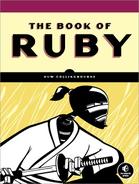In Ruby, an integer (or Fixnum) has a fixed identity. Every instance of the number 10 or every variable to which the value 10 is assigned will have the same object_id. The same cannot be said of other data types. Each instance of a floating-point number such as 10.5 or of a string such as “hello world” will be a different object with a unique object_id. Be aware that when you assign an integer to a variable, that variable will have the object_id of the integer itself. But when you assign some other type of data to a variable, a new object will be created even if the data itself is the same at each assignment:
object_ids.rb
# 10 and x after each assignment are the same object puts( 10.object_id ) x = 10 puts( x.object_id ) x = 10 puts( x.object_id ) # 10.5 and x after each assignment are 3 different objects! puts( 10.5.object_id ) x = 10.5 puts( x.object_id ) x = 10.5 puts( x.object_id )
But why does all this matter?
It matters because of a few rare exceptions to the rule. As I said earlier, most of the time, a method has a well-defined way in and a well-defined way out. Once an argument goes inside a method, it enters a closed room. Any code outside that method has no way of learning about any changes that have been made to the argument until it comes out again in the form of a returned value. This is, in fact, one of the deep secrets of “pure” object orientation. The implementation details of methods should, in principle, be hidden away, or encapsulated. This ensures that code outside an object cannot be dependent on things that happen inside that object.
